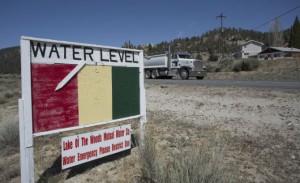With the release this week of the State’s Safeguarding California: Implementation Action Plans, the work of CDFA is detailed along with other state government agencies working to adapt to climate change.
Excerpts:
CDFA has developed outreach and incentive programs such as the Healthy Soils Initiative, the State Water Efficiency and Enhancement Program (SWEEP), and the Dairy Digester Research and Development Program (DDRDP).
The Healthy Soils Initiative is a central piece of CDFA’s efforts to develop climate-smart management practices. Governor Brown introduced the Healthy Soils Initiative in his proposed budget for the 2015 – 2016 fiscal year. The purpose of the Healthy Soils Initiative is to build the organic matter content in soils which offers multiple benefits that contribute to food security and climate change resilience. Soils that are rich in carbon, or soil organic matter (SOM), are more resistant to erosion (such as could occur in an extreme wind or precipitation events), have greater water retention (providing resiliency during water scarcity) and provide nutrients to crops, among numerous other ecosystem benefits.
Senate Bill 103, emergency drought legislation from March 2014, designated $10 million from the Greenhouse Gas Reduction Fund for CDFA to disperse to farmers for the implementation of irrigation practices that save water and reduce greenhouse gas (GHG) emissions. The resulting program, the State Water Efficiency and Enhancement Program (SWEEP), promotes both climate change mitigation and adaptation through water management and energy efficiency, making agriculture more resilient to the impacts that climate change will have on water and energy resources. CDFA designed SWEEP to provide grants for irrigation improvements that conserve water (e.g., conversion of flood irrigation to micro irrigation or implementation of water management tools) with energy efficiency components (e.g., conversion of diesel pumps to electric or renewable energy sources) that reduce GHG emissions. These projects have allowed farmers to effectively manage water resources and create resiliency in their operations through the use of on-farm technologies (e.g., soil water sensors and irrigation scheduling).
CDFA is also working on incentivizing practices to obtain both mitigation and adaptation on California dairies through the Dairy Digester Research and Development Program (DDRDP). Dairy anaerobic digesters are poised to become a larger contributor to California’s renewable energy portfolio. By utilizing methane to create renewable energy, they mitigate methane greenhouse gas emissions and also help the industry adapt to a changing climate. In 2014, CDFA was provided $12 million from the Greenhouse Gas Reduction Fund to provide grants for digester development and to fund research and demonstration projects that study and facilitate changes in manure management practices at California dairies that will directly result in greenhouse gas emission reductions: and, facilitate improved understanding of the scientific and technical aspects of dairy digesters.
Climate change is inevitably going to transform California’s agricultural sector. The goal of agricultural adaptation efforts should be sustainability and continued vibrancy in the agricultural community at all farm sizes. Engagement with stakeholders must be an underlying theme throughout all state activities in order achieve successful proliferation of information and elicit collaborative efforts. CDFA will continue to engage with partners and stakeholders to find new ways to build resilience in the sector.
Link to Safeguarding California Agricultural Sector Plan
Link to full Safeguarding California: Implementation Actions Plans report



